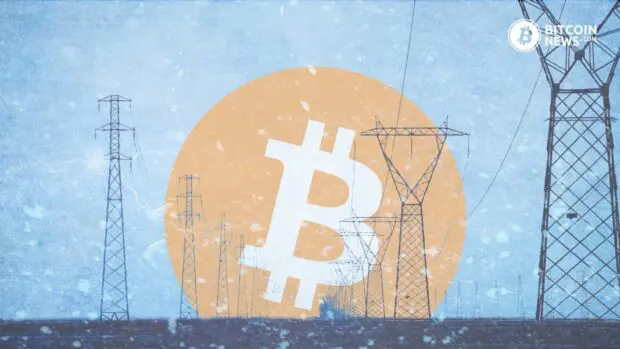In a recent development, Bitcoin hashrate experienced a substantial decline of around 25%, attributed to curtailment requests from the Texas grid regulator. This reduction unfolded over the past few days, following a cold snap in Texas, the state that has firmly established itself as a global hub for the bitcoin mining industry.

The decline in global hashrate estimates, as per the data from Ycharts and MiningPoolStats, reveals a drop from around 600 EH/s on January 12 to 450 EH/s by January 16. This coincides with a weather warning issued by the Electric Reliability Council of Texas (ERCOT) due to the extreme cold weather in the region. ERCOT serves as the grid regulator for most of Texas.

ERCOT’s warning prompted energy conservation appeals on consecutive days, emphasizing the low operating reserves expected due to freezing temperatures, high demand, and unusually low wind.
Bitcoin Hashrate Drops: Curtailment Request From ERCOT
The 25% hash rate reduction implies a drop in more than four gigawatts of power capacity during this period. Foundry USA Pool, among the largest mining pool operators by hashrate, appeared to be responsible for around half of the decline. Its hashrate dropped from an estimated 155 EH/s on Friday to 77 EH/s on Tuesday before recovering, according to MiningPoolStats.
Notably, other mining pool operators in Texas, like Luxor Mining Pool and Marathon Digital, also felt the repercussions of the cold snap. Luxor mining partners reduced operations, shutting down machines to contribute power back to the grid.
On the other hand, Marathon also voluntarily curtailed operations to support the state’s grid and citizens during the cold outbreak. The company’s VP of Corporate Communications, Charlie Schumacher, highlighted the role of Bitcoin miners as a technology solution for the energy sector. He stated:
“Bitcoin miners are, among other things, a technology solution for the energy sector. In Texas, they serve as baseload that can be curtailed in minutes to free up energy for others in a time of crisis. That’s exactly what we’ve seen play out over the past few days.”
Bitcoin miners located in Texas are accustomed to receiving curtailment requests. In August, ERCOT granted Riot Platforms $31.7 million in power and demand response credits following a substantial decrease in power consumption during a summer heatwave. Similarly, Iris Energy received $2.3 million in energy credits during the same month. This boost in credits was a result of their voluntary curtailment efforts at the Childress site in Texas.
Texas the Bitcoin Mining Hub
Texas has recently gained prominence in the Bitcoin mining industry, particularly after China’s crackdown on the industry in 2021. Major mining firms like Marathon Digital, Riot Platforms, and Iris Energy have contributed to the concentration of mining facilities in Texas.
Cheap electricity, grid incentives, and the state’s deregulated energy market have been key attractors to this growth in the region. Foundry’s report from September indicates that the U.S.-based Bitcoin miners in Texas accounted for 28.5% of its hashrate, a substantial increase from 8.4% in 2021.










